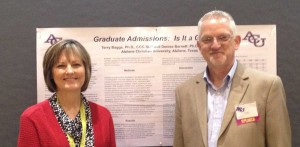Baggs and Barnett Publish Seminal Article on Grad Admissions
 Finding the perfect fit in graduate programs has become increasingly difficult as the number of graduate applications swell across the nation. Graduate program admissions commitees are faced with the difficult task of predicting which applicants will be successful graduate students.
Finding the perfect fit in graduate programs has become increasingly difficult as the number of graduate applications swell across the nation. Graduate program admissions commitees are faced with the difficult task of predicting which applicants will be successful graduate students.
Dr. Terry Baggs and Dr. Denise Barnett, along with Dr. Kim McCullough from Appalachian State University, are poised to publish an article that tackled the problem of predicting student success in grad school. Coming out in the March issue of Journal of Allied Health, this article considered numerous cognitive variables used when making admissions decisions: grade point averages, GRE scores, and grades in communication disorders courses. These variables were compared to the student’s Praxis score upon their finishing the graduate program of study. Dr. Baggs explains that “the Praxis score doesn’t necessarily indicate that an individual is a good clinician, but graduate programs are assessed on their Praxis pass rates.”
The largest study of its kind in speech-language pathology, the research team considered admissions data from four graduate programs in speech-language pathology (ACU, Harding University, Arkansas State University, and the University of Central Arkansas) to assess the relationships among grades, GRE scores, and the Praxis.
So, what were their findings? The researchers were able to predict with an astounding 87% accuracy whether a student would pass or fail the Praxis on the first attempt based solely on the student’s grades in undergraduate physical sciences and speech-hearing science classes and total score on the GRE. “This doesn’t mean that other things aren’t important,” says Dr. Baggs, “but it emphasizes the importance of certain variables in predicting academic success.” According to Dr. Baggs, this research has been helpful in implementing strategies for streamlining the admissions process and balancing their approach with both academic and more subjective variables. For example, they now require an interview for those applicants who have made it to the final stages of the application process. Their careful attention to balancing academic and personal variables help to find applicants who are likely to become successful clinicians. The article reference is: Journal of Allied Health 2015; 44(1):10-16.
